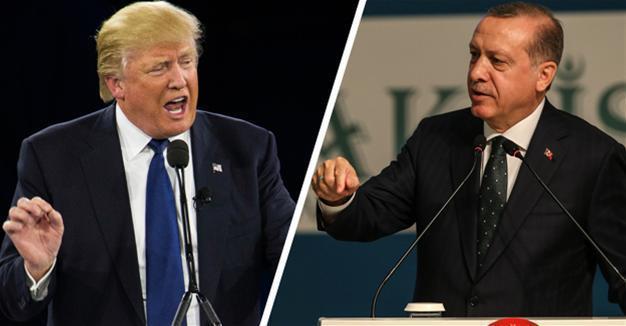Erdoğan to meet Trump amid disagreements on YPG
Sevil Erkuş - ANKARA
 President Recep Tayyip Erdogan will hold discussions in Washington on May 16 at a delicate time for bilateral ties after U.S. President Donald Trump authorized the direct arming of Syrian Kurdish fighters from the People’s Protection Units (YPG).
President Recep Tayyip Erdogan will hold discussions in Washington on May 16 at a delicate time for bilateral ties after U.S. President Donald Trump authorized the direct arming of Syrian Kurdish fighters from the People’s Protection Units (YPG). Erdoğan will meet Trump for the first time since the latter assumed office, with the talks “to be in the format of a point rather than a comma” in terms of the allies’ future ties, according to the Turkish leader.
Syria will dominate the agenda as the Turkish leader tries for a final time to try to convince the American president to change his mind about cooperating with the YPG ahead of a massive military campaign in Raqqa with the Syrian Democratic Forces (SDF), which are dominated by Kurdish fighters.
The Pentagon has identified the Syrian Kurdish militia as the local partner best-placed to drive the Islamic State of Iraq and the Levant (ISIL) out of Raqqa. The U.S. will deliver small arms, ammunition, machine guns, armored vehicles and engineering equipment to the YPG. The shipments were pre-positioned and could be delivered to the Kurdish militia “very quickly,” according to U.S. Col. John Dorrian, a spokesman for the U.S. military in Baghdad.
Erdoğan blamed Trump’s decision on civil servants from former President Barack Obama’s administration. “There are Obama’s men in lower positions [in the current administration]. He [Trump] is looking at the situation in Iraq and Syria through the information fed by them. And I say there is no need for the YPG or the PYD [Syrian Kurdish Democratic Union Party]. These are terrorist organizations. Considering cooperation with the YPG as a condition to fight Daesh is in fact destroying the reputation of the U.S. and the [U.S.-led anti-ISIL] coalition,” Erdoğan told a group of journalists in Beijing on May 14.
The Obama administration previously provided arms to the SDF, while deploying hundreds of U.S. special operations troops to northern Syria to train Syrian Kurdish fighters.
Turkey and the U.S. are at odds over the designation of the YPG and PYD. Turkey has entirely attempted to portray the two groups as terrorists since Ankara sees the Syrian Kurdish fighters as an offshoot of the outlawed Kurdistan Workers’ Party (PKK), and complains that the American arms will eventually reach the PKK. But the U.S. sees the YPG as effective partners on the ground in their fight against ISIL.
Turkey wants Ankara-backed Free Syrian Army (FSA) fighters to be used instead of YPG/PYD forces in a Raqqa operation, along with Arab elements of the SDF, but has failed to convince Washington to do so.
On April 25, Turkish military carried out air strikes against YPG positions in northern Syria, killing at least 20 Kurdish fighters. The U.S. not only condemned the attack, but also deployed more troops and armored vehicles in the region to serve as a buffer between Turkey and the YPG. Last week, Erdoğan said he would show Trump pictures and video footage showing American flags and YPG banners flying side by side, while U.S. Marines and YPG fighters stood guard together.
Washington, meanwhile, has suggested it will attempt to assuage Turkey’s concerns by supporting Turkish security. The Wall Street Journal on May 10 reported that the U.S. was beefing up joint intelligence efforts with Turkey to help the government better target terrorists in the region, according to U.S. officials. The daily reported the effort could end up doubling the capacity of an intelligence fusion center in Ankara.
A high-level Turkish delegation visited Washington in early May ahead of Erdoğan’s talks, with adviser İbrahim Kalın, National Intelligence Organization (MİT) head Hakan Fidan, Chief of General Staff Gen. Hulusi Akar and Justice Minister Bekir Bozdağ all preparing the groundwork.
“They presented lot of documents to help clear the U.S. stance on YPG. Now we will have the final meeting, and then we will make our final decision. If we are strategic partners, we should make decisions in an alliance. If the alliance will be overshadowed, then we will have to take care of ourselves,” Erdoğan told reporters.
Turkey has demanded that Washington sever its cooperation with the YPG and extradite Fethullah Gülen, the self-exiled Islamic cleric who resides in Pennsylvania and whom the Turkish government accuses of masterminding the failed coup attempt of July 2016.
Bozdağ presented new evidence supporting the accusation that Gülen was involved in the attempted takeover as the process between Turkish and U.S. judicial authorities continues in terms of procedure.
On July 19, 2016, Ankara sent four dossiers to support its demand for Gülen’s extradition at Washington’s request and demanded his temporary arrest in September 2016, but Turkish politicians have reproached the U.S. over its apparent reluctance to process Turkey’s request.
Erdoğan is also likely to request the release of Reza Zarrab, a Turkish-Iranian businessman, and Mehmet Hakan Atilla, a deputy general manager of the Turkish state-owned Halk Bank, who are both on trial in the U.S. for violating sanctions against Iran.
Zarrab was at the center of a massive graft scandal in 2013 that included senior government figures.
















